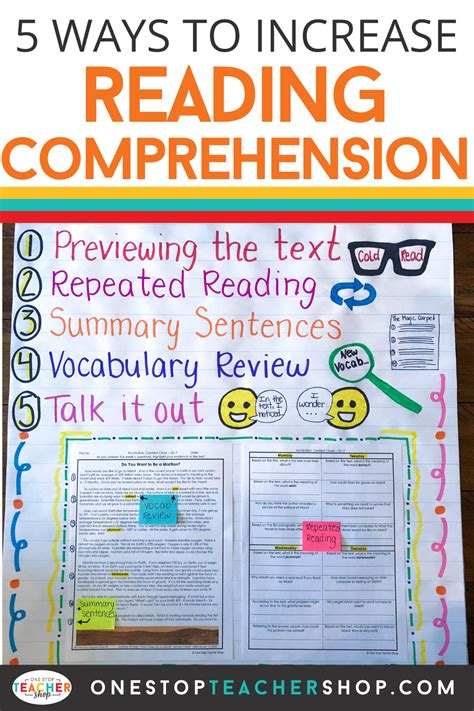Improving comprehension is a multifaceted process that involves developing a range of skills, from decoding and fluency to critical thinking and metacognition. At its core, comprehension is the ability to extract meaning from written or spoken language, and it is essential for learning, communication, and personal growth. In this article, we will explore the key strategies and techniques for improving comprehension, with a focus on practical applications and evidence-based approaches.
Key Points
- Developing metacognitive skills, such as self-monitoring and self-regulation, is crucial for improving comprehension.
- Activating prior knowledge and making connections to existing knowledge can enhance comprehension.
- Using visual aids, such as diagrams and charts, can help to organize and retain information.
- Practicing active reading strategies, such as summarizing and questioning, can improve comprehension.
- Engaging in collaborative learning activities, such as discussions and group work, can foster a deeper understanding of complex concepts.
Metacognitive Strategies for Improving Comprehension

Metacognition refers to the ability to think about and reflect on one’s own thinking. Developing metacognitive skills is essential for improving comprehension, as it enables individuals to monitor their own understanding, identify areas of difficulty, and adjust their approach accordingly. Some effective metacognitive strategies for improving comprehension include self-questioning, self-monitoring, and self-regulation. For example, readers can ask themselves questions like “What is the main idea of this text?” or “What is the author trying to say?” to clarify their understanding.
The Role of Prior Knowledge in Comprehension
Prior knowledge plays a significant role in comprehension, as it provides a foundation for new learning and helps to create connections between different pieces of information. Activating prior knowledge can be achieved through various strategies, such as brainstorming, concept mapping, and previewing. For instance, before reading a text, readers can brainstorm what they already know about the topic, or create a concept map to visualize the relationships between different concepts. By activating prior knowledge, individuals can build on their existing understanding and develop a deeper comprehension of complex concepts.
| Strategy | Description |
|---|---|
| Self-questioning | Asking oneself questions to clarify understanding |
| Self-monitoring | Tracking one's own progress and adjusting approach as needed |
| Self-regulation | Controlling one's own emotions and motivations to stay focused |
| Activating prior knowledge | Accessing existing knowledge to build on new information |
| Using visual aids | Organizing information with diagrams, charts, and other visual tools |

Active Reading Strategies for Improving Comprehension

Active reading strategies involve engaging with the material in a way that promotes comprehension and retention. Some effective active reading strategies include summarizing, questioning, and visualizing. For example, readers can summarize the main points of a text in their own words, or ask questions like “What is the author’s purpose?” or “What are the implications of this information?” to clarify their understanding. Additionally, visualizing the information can help to create a mental image and promote retention.
The Benefits of Collaborative Learning
Collaborative learning involves working with others to achieve a common goal, and it can be an effective way to improve comprehension. By engaging in discussions, group work, and other collaborative activities, individuals can share their knowledge and perspectives, and develop a deeper understanding of complex concepts. Collaborative learning can also help to promote critical thinking, problem-solving, and communication skills, all of which are essential for academic and professional success.
In conclusion, improving comprehension is a complex process that involves developing a range of skills and strategies. By incorporating metacognitive strategies, activating prior knowledge, using visual aids, practicing active reading strategies, and engaging in collaborative learning activities, individuals can enhance their comprehension and achieve their academic and professional goals. As we continue to navigate the complexities of the 21st century, it is essential that we prioritize the development of comprehension skills, and provide individuals with the tools and support they need to succeed.
What is the most effective way to improve comprehension?
+The most effective way to improve comprehension is to develop a range of skills and strategies, including metacognitive strategies, activating prior knowledge, using visual aids, practicing active reading strategies, and engaging in collaborative learning activities.
How can I activate my prior knowledge to improve comprehension?
+You can activate your prior knowledge by brainstorming, concept mapping, and previewing. These strategies can help you to access your existing knowledge and build on new information.
What are the benefits of collaborative learning for improving comprehension?
+Collaborative learning can help to promote critical thinking, problem-solving, and communication skills, all of which are essential for academic and professional success. It can also provide individuals with the opportunity to share their knowledge and perspectives, and develop a deeper understanding of complex concepts.
